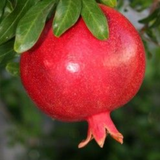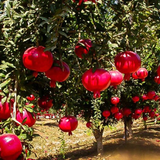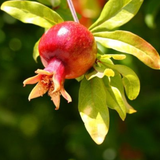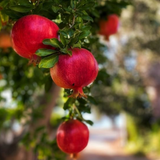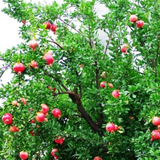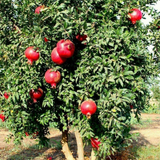Exotic tree with red flesh.
Scientific name: Punica granatum,
English Name: Wild pomegranate
Local Name: NA
General information
Punica granatum is a small multi-stemmed shrub or tree 5-10m tall. Canopy open, crown base low. Stem woody and spiny, bark smooth and dark grey. Punica granatum is vulnerable to fire, frost damage to trees is irrecoverable. Strongly alkaline soils but tolerates soil compaction, drought and seasonal waterlogging Prefers well drained, heavy, light and medium soils.1000
Livestock benefits
The leaves are browsed by domesticated stock.
Human benefits
The seeds have a fresh, sweet-sour, very pleasant taste, grenadine, a reduced juice from fresh pomegranate seeds common for desserts. It is used for marinating and tenderizing meat due to its proteolytic enzymes. Dried pomegranate seeds, has culinary importance as spice for vegetable and legume dishes. They impart a subtle, sweet-sour and tart flavor popular in Punjab and Gujrat. The edible fruit portion contains 10% sugars, 36.6 mg Vitamin C/100 ml of juice, 2.6% protein, 0.1% Phosphorous, 0.4% Potassium, 0.03%, 0.1% Calcium and 0.13% Magnesium. Tree branches used as firewood and the wood is hard and durable, mostly used in making farm instruments. The root bark yields a black ink rich in tannins and useful in dyeing/tanning leather. Leaves of pomegranate are a beautiful light red, making it a suitable ornamental choice for gardens and amenity parks.
Farmer benefits
The tree is sometimes used for fencing. Pomegranate is a good intercropping plant and grows along well with other plants such as grapes. Used in water purification.







